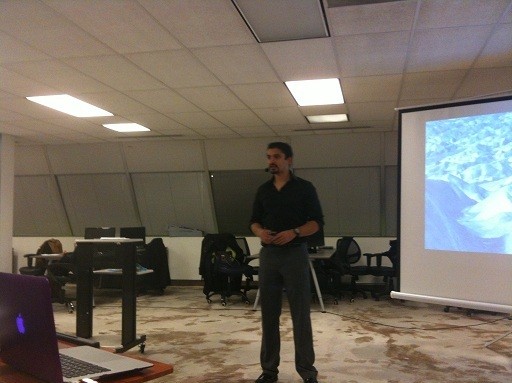Meetup Focuses on Keeping New Year’s Resolutions and Setting Business Goals

Success coach Akshay Nanvati gives some tips on how businesses can keep New Years resolutions at the NJ Entrepreneurs and Technology Startup meetup | Esther Surden
The NJ Entrepreneurs and Technology Startups Meetup held a holiday meet and greet — which included a short presentation titled “How to Keep New Year’s Resolutions in Your Life and Business” — on Dec. 13, 2012, at JuiceTank Innovation Lab (Somerset).
Akshay Nanavati, a trained success coach, explorer and former Marine, provided tips for obtaining results in the new year. NJTechWeekly.com has decided that now is about the time our readers might need such advice, so we include below a few takeaways from Nanavati’s presentation.
- Mundane actions day after day lead to something extraordinary. After undertaking a 350-mile, 28-day journey under frozen conditions, Nanavati said there was nothing exciting about each day of the trip. All he and his fellow travelers did was put one foot in front of the other for the 28 days, yet they achieved something extraordinary. To keep your New Year’s resolutions or achieve your goals, it takes mundane daily actions. “It’s the compound effect of those daily actions over time that results in success,” Nanavati said. The hard part is that you don’t know if or when you might reach your goal. “You just have to have the faith to keep pushing on,” he noted.
- Set goals. Just 50 percent of Americans make New Year’s resolutions, and only 8 percent actually keep them. That’s a really small number. But New Year’s is a time for business owners and entrepreneurs to take account of themselves in order to move forward. If you can set a target, you can keep moving forward, faster and more intensively than before.
- Watch out for limiting beliefs. Two elements for success involve being and doing. Most people go from “have” to “do” to “be”: they have to have things like money to dothings like travel in order to be happy. However, the thought leaders in the human potential and performance field believe the first step is to be. Once you shape the “be,” the other steps follow. The first step to being is knowing who you are. How do you do that? Ask yourself what your self-identity is. Studies have shown that people who believe they are $35,000 salespeople make just that. So you have to look at your limiting beliefs.
- Change is possible. It’s a misconception that people resist change. Rather, they resist what they believe to be wrong in the face of existing beliefs.
- Make it more painful to keep doing what you are doing than to try to achieve your goals. Everything you do — even in business — is driven by two forces: the need to avoid pain and the desire to gain pleasure. Let’s say you procrastinate. You associate pain with taking action more than you connect pleasure to the end result of taking action. You can change these associations, Nanavati said.
- Shift perspective by asking yourself the right questions. A victim asks, How can my business survive in this economy? A warrior asks, What can I learn from this?, What else can I make this mean? and What is good about this? Shifting your perspective can change your destiny.
- Find the space to make a different choice. Quoting Viktor Frankl, Nanavati said, “Between stimulus and response there is a space. In that space is our power to choose our response. In our response lies our growth and our freedom.”
- Leverage “shoulds” into “musts.” Turn a “should” into a “must” by making it a “why.” Clients will buy from you if you have a compelling enough “why.” “What will it do for your business to have a strong enough ‘why’ that your customers can associate with and align with?” Nanavati asked.
- Light a fire under yourself to make changes. Make your life painful and become disturbed by where you are right now so you will change.
- Adopt a deathbed mentality. Every night before you go to bed, visualize your mortality and ask yourself if you are happy with where your life is right now. Was today a day worth living?
- Self-love is important. You can be unstoppable mentally when you achieve balance and self-love. Then, no matter how many times your business falls, you’ll have the strength to raise it back up.
- Take risks. As entrepreneurs, we’ve all taken risks and learned from them. Self-confidence is the result of having successfully survived taking a risk.

